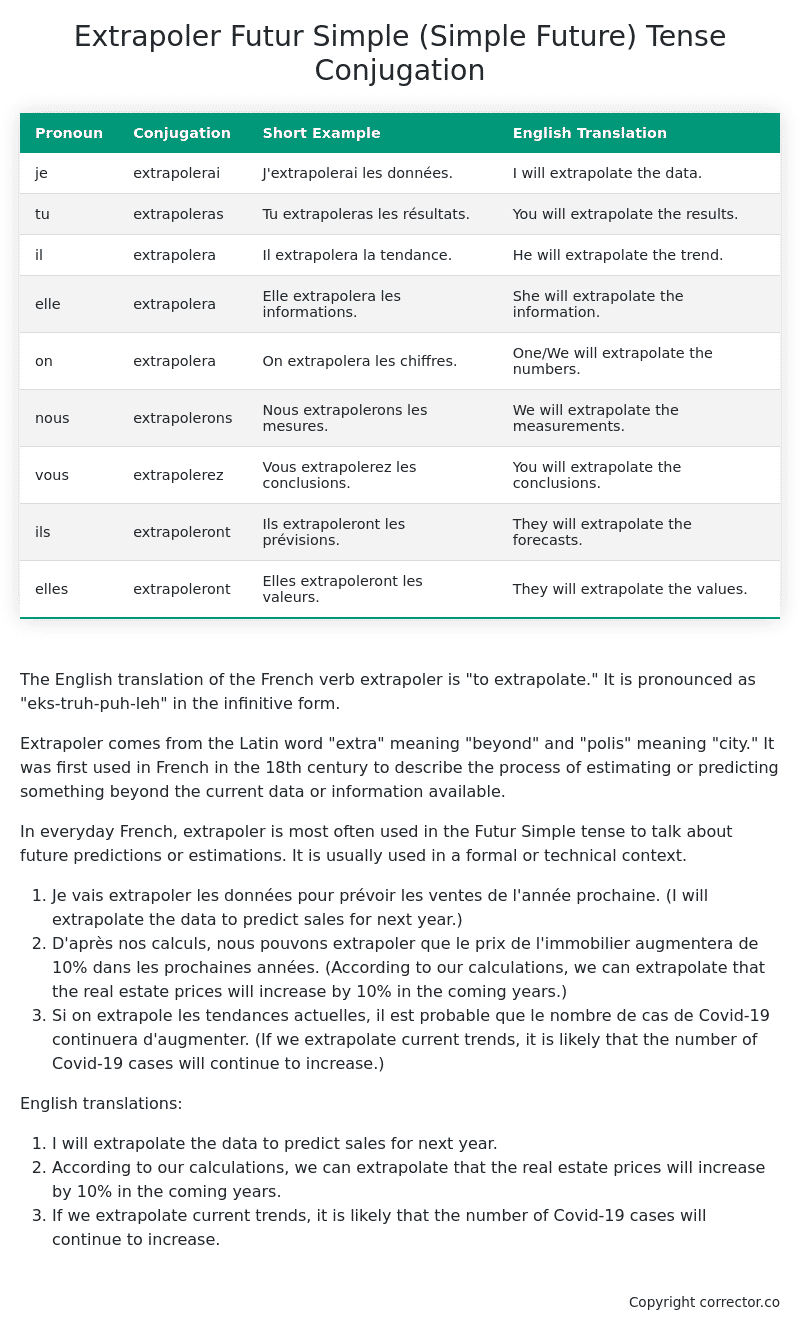Futur Simple (Simple Future) Tense Conjugation of the French Verb extrapoler
Introduction to the verb extrapoler
The English translation of the French verb extrapoler is “to extrapolate.” It is pronounced as “eks-truh-puh-leh” in the infinitive form.
Extrapoler comes from the Latin word “extra” meaning “beyond” and “polis” meaning “city.” It was first used in French in the 18th century to describe the process of estimating or predicting something beyond the current data or information available.
In everyday French, extrapoler is most often used in the Futur Simple tense to talk about future predictions or estimations. It is usually used in a formal or technical context.
- Je vais extrapoler les données pour prévoir les ventes de l’année prochaine. (I will extrapolate the data to predict sales for next year.)
- D’après nos calculs, nous pouvons extrapoler que le prix de l’immobilier augmentera de 10% dans les prochaines années. (According to our calculations, we can extrapolate that the real estate prices will increase by 10% in the coming years.)
- Si on extrapole les tendances actuelles, il est probable que le nombre de cas de Covid-19 continuera d’augmenter. (If we extrapolate current trends, it is likely that the number of Covid-19 cases will continue to increase.)
English translations:
- I will extrapolate the data to predict sales for next year.
- According to our calculations, we can extrapolate that the real estate prices will increase by 10% in the coming years.
- If we extrapolate current trends, it is likely that the number of Covid-19 cases will continue to increase.
Table of the Futur Simple (Simple Future) Tense Conjugation of extrapoler
| Pronoun | Conjugation | Short Example | English Translation |
|---|---|---|---|
| je | extrapolerai | J’extrapolerai les données. | I will extrapolate the data. |
| tu | extrapoleras | Tu extrapoleras les résultats. | You will extrapolate the results. |
| il | extrapolera | Il extrapolera la tendance. | He will extrapolate the trend. |
| elle | extrapolera | Elle extrapolera les informations. | She will extrapolate the information. |
| on | extrapolera | On extrapolera les chiffres. | One/We will extrapolate the numbers. |
| nous | extrapolerons | Nous extrapolerons les mesures. | We will extrapolate the measurements. |
| vous | extrapolerez | Vous extrapolerez les conclusions. | You will extrapolate the conclusions. |
| ils | extrapoleront | Ils extrapoleront les prévisions. | They will extrapolate the forecasts. |
| elles | extrapoleront | Elles extrapoleront les valeurs. | They will extrapolate the values. |
Other Conjugations for Extrapoler.
Le Present (Present Tense) Conjugation of the French Verb extrapoler
Imparfait (Imperfect) Tense Conjugation of the French Verb extrapoler
Passé Simple (Simple Past) Tense Conjugation of the French Verb extrapoler
Passé Composé (Present Perfect) Tense Conjugation of the French Verb extrapoler
Futur Simple (Simple Future) Tense Conjugation of the French Verb extrapoler (this article)
Futur Proche (Near Future) Tense Conjugation of the French Verb extrapoler
Plus-que-parfait (Pluperfect) Tense Conjugation of the French Verb extrapoler
Passé Antérieur (Past Anterior) Tense Conjugation of the French Verb extrapoler
Futur Antérieur (Future Anterior) Tense Conjugation of the French Verb extrapoler
Subjonctif Présent (Subjunctive Present) Tense Conjugation of the French Verb extrapoler
Subjonctif Passé (Subjunctive Past) Tense Conjugation of the French Verb extrapoler
Subjonctif Imparfait (Subjunctive Imperfect) Tense Conjugation of the French Verb extrapoler
Subjonctif Plus-que-parfait (Subjunctive Pluperfect) Tense Conjugation of the French Verb extrapoler
Conditionnel Présent (Conditional Present) Tense Conjugation of the French Verb extrapoler
Conditionnel Passé (Conditional Past) Tense Conjugation of the French Verb extrapoler
L’impératif Présent (Imperative Present) Tense Conjugation of the French Verb extrapoler
L’infinitif Présent (Infinitive Present) Tense Conjugation of the French Verb extrapoler
Struggling with French verbs or the language in general? Why not use our free French Grammar Checker – no registration required!
Get a FREE Download Study Sheet of this Conjugation 🔥
Simply right click the image below, click “save image” and get your free reference for the extrapoler Futur Simple tense conjugation!

Extrapoler – About the French Futur Simple (Simple Future) Tense
Formation of Futur Simple
For regular -er verbs (e.g., parler – to speak)
For regular -ir verbs (e.g., finir – to finish)
For regular -re verbs (e.g., vendre – to sell)
Common Everyday Usage Patterns
Conditional Statements
Interactions with Other Tenses
Futur Antérieur
Conditional
Present
Summary
I hope you enjoyed this article on the verb extrapoler. Still in a learning mood? Check out another TOTALLY random French verb conjugation!


